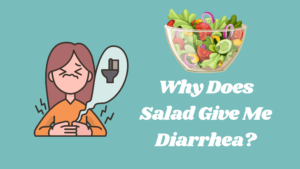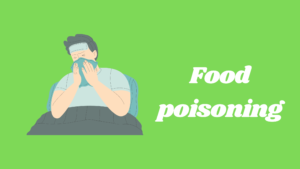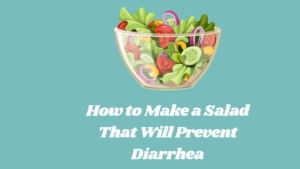
Why does salad give me diarrhea? Salads can be a healthy and nutritious food option. Salads are typically made with a variety of vegetables, such as lettuce, spinach, tomatoes, cucumbers, and carrots, which are rich in vitamins, minerals, and fiber. Adding lean proteins, such as grilled chicken or fish, or plant-based proteins, such as beans or tofu, can further increase the nutritional value of a salad.
However, it is important to keep in mind that not all salads are created equal. Some salads may be high in calories, fat, and sodium if they are loaded with cheese, croutons, bacon, or creamy dressings. It is important to read nutrition labels or ask for ingredient information when eating out to make informed choices about what you are eating. In this article, we will explain why does salad give you diarrhea? and how to prevent it.
Why does salad give you diarrhea?
Diarrhea is a common digestive issue that can be caused by a variety of factors, including certain foods. While salads are generally considered healthy and nutritious, they can sometimes cause digestive upset and diarrhea. There are several possible reasons why does salad give me diarrhea including:
Bacteria
Raw vegetables and leafy greens used in salads can harbor harmful bacteria such as E. coli, Salmonella, and Listeria, which can cause diarrhea from salad and other foodborne illnesses. These bacteria can contaminate produce during harvesting, processing, or handling, and can survive in moist environments like salad greens. If the greens are not washed thoroughly before being used in a salad, the bacteria can be ingested and cause gastrointestinal distress.
To avoid this, it is important to properly wash all produce before using it in a salad. This can be done by rinsing the produce thoroughly under running water, and scrubbing any firm produce, like cucumbers and carrots, with a brush. It is also important to store and handle produce at the proper temperature, and to avoid cross-contamination with raw meat or poultry.
Food intolerances
Some people may have an intolerance to certain ingredients in salads such as dairy, nuts, or gluten, which can cause digestive upset and diarrhea. For example, lactose intolerance is a common condition where the body is unable to digest lactose, a sugar found in dairy products. If a salad contains cheese or other dairy products, it can trigger diarrhea in those with lactose intolerance. Similarly, if a salad contains nuts or gluten, it can trigger digestive symptoms in those with allergies or intolerances to those ingredients.
To avoid digestive issues related to food intolerances, it is important to be aware of any allergies or intolerances you may have and to avoid foods that trigger symptoms. In some cases, substituting certain ingredients or choosing a different salad dressing can help to reduce the risk of digestive upset.
Fiber
Salads are usually high in fiber, which is great for digestion and can help prevent constipation. However, for some people, consuming too much fiber too quickly can cause diarrhea after eating salad. Fiber absorbs water in the digestive tract, which can increase the bulk of stool and promote bowel movements. If you are not used to consuming a lot of fiber, adding too much to your diet too quickly can overwhelm your digestive system and lead to diarrhea.
To avoid fiber-related diarrhea, it is important to gradually increase your fiber intake over time. This can be done by adding fiber-rich foods to your diet slowly and increasing your water intake to help the fiber move through your system.
Dressings and toppings
Salad dressings, croutons, and other toppings can be high in fat and calories, which can irritate the digestive system and lead to diarrhea. Fatty foods can increase the production of bile, a fluid that helps digest fats, and can also slow down digestion, leading to diarrhea. Additionally, some dressings may contain artificial sweeteners or preservatives that can irritate the digestive system and cause diarrhea after eating salad.
To avoid digestive issues related to dressings and toppings, it is important to choose dressings and toppings that are low in fat and calories. You can also try making your own salad dressing using olive oil, vinegar, and other natural ingredients.
Food poisoning

If the salad has been prepared with contaminated food or if it has been left out at room temperature for too long, it can cause food poisoning, which can result in diarrhea and other symptoms. Food poisoning can be caused by bacteria, viruses, or parasites that can contaminate food during processing, handling, or storage. Symptoms of food poisoning can include diarrhea, nausea, vomiting, fever, and abdominal pain.
To avoid food poisoning, it is important to handle and store food properly.
Food Sensitivity or Allergy
Food sensitivities or allergies can be another reason why a salad can give you diarrhea. Food allergies occur when your immune system mistakenly identifies a protein in a food as harmful and releases histamine and other chemicals to fight it off. This can lead to a range of symptoms, including diarrhea, vomiting, hives, and difficulty breathing.
Common food allergens include nuts, shellfish, eggs, milk, soy, and wheat. If you have a food allergy, even a small amount of the allergen can trigger a reaction. For example, if you are allergic to nuts and a salad contains nuts, even a small amount can cause diarrhea from salads and other symptoms.
IBS or Crohn’s Disease
Irritable bowel syndrome (IBS) and Crohn’s disease are two digestive disorders that can also be a reason why does salad give me diarrhea.
IBS is a chronic digestive disorder that affects the large intestine. It is characterized by abdominal pain, bloating, gas, and changes in bowel habits, including diarrhea or constipation. Certain foods, including raw vegetables and fruits, can trigger symptoms in people with IBS. In some cases, eating a salad can lead to diarrhea and other symptoms in people with IBS.
Crohn’s disease, on the other hand, is a type of inflammatory bowel disease (IBD) that can affect any part of the digestive tract, from the mouth to the anus. It is characterized by inflammation of the intestinal lining, which can cause diarrhea, abdominal pain, and other symptoms. Eating certain foods, including raw vegetables and fruits, can trigger symptoms in people with Crohn’s disease.
Both IBS and Crohn’s disease are chronic conditions that require ongoing management. If you suspect that you have IBS or Crohn’s disease, it is important to work with a healthcare provider to develop an individualized treatment plan that may include dietary changes, medications, and lifestyle modifications.
How to Make a Salad That Will Prevent Diarrhea

Salads are a great way to incorporate nutrient-dense vegetables into your diet, but if you’ve experienced diarrhea after eating salad, it may be time to reevaluate how you prepare and consume them.
Here are some tips for making a salad that will prevent diarrhea:
Cook Your Vegetables
While raw vegetables are packed with fiber and nutrients, they can be difficult to digest for some people. Cooking your vegetables can make them easier on your digestive system. Try roasting or steaming your vegetables before adding them to your salad. Cooked vegetables like sweet potatoes, squash, and carrots are great options for a salad and can add a nice texture and flavor.
Limit Beans and Cruciferous Vegetables
While beans and cruciferous vegetables like broccoli, cauliflower, and Brussels sprouts are healthy and nutritious, they are also high in fiber and can be difficult to digest for some people. If you’re prone to diarrhea, it’s a good idea to limit these types of vegetables in your salad. Instead, opt for low-fiber vegetables like cucumbers, bell peppers, and tomatoes.
Wash Your Vegetables
It’s important to wash your vegetables thoroughly before consuming them to prevent contamination from bacteria like E. coli or Salmonella. Rinse your vegetables under running water and use a brush to scrub any dirt or debris. It’s also a good idea to avoid pre-cut vegetables, as they may have a higher risk of contamination.
Avoid High-Fat Dressings and Toppings
Salad dressings and toppings like cheese, bacon, and croutons can be high in fat, which can slow down digestion and contribute to diarrhea. Instead, opt for low-fat dressings like vinaigrettes or salsa, and toppings like nuts or seeds.
Gradually Increase Your Fiber Intake
If you’re not used to eating a lot of fiber, it’s important to gradually increase your intake to avoid digestive issues like diarrhea. Start by adding a small amount of fiber to your salad, like a few slices of cucumber or a handful of cherry tomatoes. Over time, you can gradually increase the amount of fiber in your salad by adding more vegetables and fruits.
Making a salad that will prevent diarrhea involves cooking your vegetables, limiting high-fiber vegetables like beans and cruciferous vegetables, washing your vegetables, avoiding high-fat dressings and toppings, and gradually increasing your fiber intake. By following these tips, you can enjoy a delicious and nutritious salad without worrying about digestive issues.
Frequently ask Questions
Do lots of salad make you poop more?
Yes, eating lots of salad can increase bowel movements and make you poop more due to the high fiber content in salad. Fiber helps to promote regular bowel movements and prevent constipation. However, it’s important to note that everyone’s digestive system is different and the frequency of bowel movements can vary.
Is salad a natural laxative?
Yes, salad can act as a natural laxative due to its high fiber content. Fiber helps to add bulk to stool, which can promote regular bowel movements and prevent constipation. However, other factors such as hydration, exercise, and overall diet also play a role in maintaining regular bowel movements.
Does salad make you poop green?
Yes, eating large amounts of leafy green vegetables, such as spinach or kale, can sometimes cause stool to appear green. This is because the green pigment chlorophyll, which is abundant in these vegetables, can give the stool a green color as it passes through the digestive system. However, other factors such as the presence of bile or food coloring can also cause green stool. If you have concerns about changes in your stool color, it’s best to speak with a healthcare provider.
Does salad make your poop soft?
Yes, eating salad can help to soften stool due to the high fiber content. Fiber helps to absorb water in the digestive system, which can add bulk to stool and make it softer and easier to pass. However, other factors such as hydration and overall diet also play a role in maintaining healthy bowel movements.
Does salad make your poop dark?
Yes, eating large amounts of certain dark-colored vegetables, such as spinach or beetroot, can sometimes cause stool to appear darker. This is because the pigments in these vegetables can sometimes be partially digested and appear in the stool. However, other factors such as the presence of blood in the stool can also cause dark stool. If you have concerns about changes in your stool color, it’s best to speak with a healthcare provider.
Does salad change stool color?
Yes, certain components of salads, such as dark-colored vegetables or food coloring, can sometimes change the color of stool. However, changes in stool color can also be caused by other factors such as medication use or health conditions. If you have concerns about changes in your stool color, it’s best to speak with a healthcare provider.
Bottom Line
While salad is generally a healthy food choice, it can sometimes cause diarrhea from salad. The reasons for this can vary, from food sensitivity or allergy to digestive disorders like IBS or Crohn’s disease. Additionally, poor hygiene practices, contaminated produce, or high-fiber and high-fat ingredients in the salad can also lead to diarrhea after eating salad.
To prevent diarrhea from salad, it’s important to pay attention to how you prepare and consume your salad. Cooking your vegetables, washing them thoroughly, and avoiding high-fiber and high-fat ingredients can help prevent digestive issues. Gradually increasing your fiber intake and working with a healthcare provider to manage underlying digestive disorders can also be helpful.
It’s important to note that if you experience frequent or severe diarrhea after eating salad, it’s important to talk to a healthcare provider to rule out any underlying medical conditions or food allergies. By making some simple adjustments to your salad ingredients and preparation, you can still enjoy a healthy and delicious meal without worrying about digestive issues.
Thanks for reading!